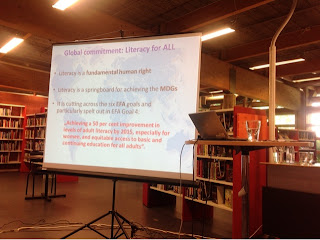Day Three at Biblioteka Botkyrka, Literacy for All 14
By day three we were all full of expectation for yet another informative session on the many aspects of literacy.
We heard from Lisa Krolek, from the UNESCO Institute for Lifelong Learning, Helene Botheius from the Adult Learning and Empowerment Fund and Lena Ryman Wilden, who spoke about her experience of using iPads and designing literacy applications for adults.
Lisa Krolek gave us an introduction into the activities of UNESCO regarding literacy and the work that they do in her institute. They specialise in life-long learning and adult education, in particular for those who have recieved little or no formal education in their lives. Their activities include advising member states on literacy issues, they host an international conference on adult education every twelve years, they share knowledge, establish conventions and policies on literacy.
Lisa spoke about the distinction between literacy and libraries within the structure of UNESCO. While literacy comes under the heading of education, libraries are considerd part of science. This means when UNESCO attend conferences such as the IFLA conference they represent literacy and education rather than libraries. UNESCO has taken a step back from libraries since IFLA has become more established. This is a good thing for IFLA but it also means hat there is no one to speak up for libraries at the higher level when policies or strategies are being formed.
Lisa also spoke of two useful resources : Adult Learning and Documetation Infirmation Network (ALADIN)
and LitBase: an online database of literacy projects from around the world.
Both resources look to be invaluable and I can see myself referring to them a lot in the future.
As with all the speakers so far this week, the question of what is literacy and what does it mean to be illiterate came up? Literacy is a fundamental human right. Lisa also said it is the foundation of life-long learning and should be one of a set of basic life skills. Literacy is a social practice and should be important at every stage in your life.
For example, the Millennium Development Goals (MDG) which will be reviewed in 2015, do not specifically mention literacy but literacy is appliciable to all of them. Also it is relevant to the six EFA goals and is mentioned in number four.
So where do libraries fit into this? As I mentioned before, the Institute does not represent libraries but they believe libraries are an integral part of creating a literacy-rich environment in a community. But, Lisa made the point that while it might be tempting, to all of us, to have libraries at the centre of every literacy strategy, it may not be necessary. She gave the Vancouver Life-long Learning Strategy as an example. This strategies has five age categories from early childhood to later life. Libraries feature in some categories but not all of them. Other elements feature such as parental involvement for Childhood and Early Adolescence and encouraging employers to facilitate learning in Adulthood.
So should libraries be part of every stage of our lives and our relationship wth literacy?
Helene Boethius spoke to us about the ALEF method of teaching from the Adult learning and Empowerment Fund.
ALEF are a non-profit organisation who currently have partnerships with five organisations in Benin, the Democratic Republic of Congo and Uganda. They facilitate adult literacy programmes for 25-40 year olds in their mother tounge. The programme consists of a two hour class, twice a week for 6 months. Participants can complete up to three levels. In 2014 there were 2657 participants.
Helene spoke of Literacy on Four Legs. She likened the structure of a table to how literacy helps us to function every day. We need all four legs for the table to be stand. The four legs are : basic skills (reading, writing, maths), awareness (reflection and analysis), cooperation ( dialogue, cooperation, friendship), and application (using accounts, cell phone, reading recipes etc).
Lena Ryman Wilden teaches Swedish in the Swedish for Immigrants school in Stockholm. She began to investigate the possibility of using iPads as a teaching tool for one of her groups who would typically be aged 50 or older and have recieved little or no schooling I their lives. She recieved funding to purchase 15 iPads for the class.
However, when she began to research suitable applications for the iPads she found that they were all designed for children. While the childrens apps were not unsuccessful, Lena was not satisfied. She decided to investigate the possibility of designing an app that would be more appropriate for adult learners.
After receiving funding she began a year-long process of designing the app and submitting it to the App Store. The result is Alfa Vux, a six level app for learning Swedish words. The app uses sounds and pictures to assist the student as they work their way through the levels. Lena hopes in the future to develop another app that deals with phrases and scentences.
The advantages to using this technology is that each student can learn at their own pace. They can also learn independently which gives Lena more opportunities for one to one help with the students during class. There are also less distractions for the students, some of whom would find concentration a challenge.
We did not have any workshop on day three, instead we were brought on a guided tour of Botkyrka which finished in the multicultural Center in Fitja.




Comments
Post a Comment